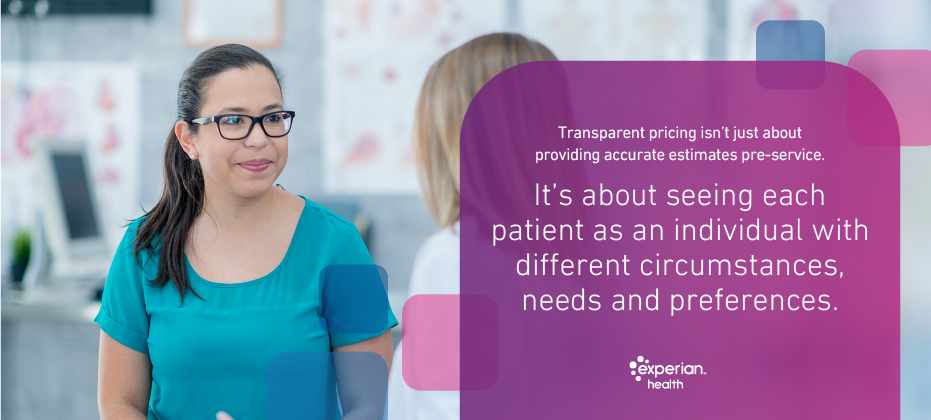
For many patients, unanticipated healthcare bills are up there with car breakdowns and untimely home repairs. No one likes a surprise bill. But when your washing machine is on its last legs, you probably do a bit of shopping around to find the best price for a replacement. Are patients doing the same when it comes to their healthcare provider?
This is the idea behind recent industry and legislative moves to improve price transparency in healthcare. Recognizing that surprise billing leaves patients feeling stressed out and anxious, lawmakers are working to find a solution that would end ‘balance billing’, where patients are billed the difference between what providers charge and what insurers will pay. These bills often come as a shock, firstly, because the patient didn’t expect the bill in the first place and secondly, because the complexities associated with healthcare expenses create opacity around the actual cost of care.
How transparent pricing builds a better patient experience
In theory, an end to balance billing in favor of more transparent pricing should improve the patient financial experience. The hope is it leads to more competition and therefore better choice and quality overall. CMS Administrator, Seema Varma, says:
“We want to empower consumers and patients to shop around for their health care and pick the provider that works best for them.”
However, some believe patients don’t yet think of healthcare providers in the same way as other consumer goods. Larry Levitt, Executive Vice President of Health Policy at the Kaiser Family Foundation says:
“Most patients don’t think of healthcare as something you can shop around for, and there’s not much incentive when you don’t foot most of the bill directly.”
Still, many healthcare organizations are on board. Giving patients greater clarity through more accurate pricing estimates and proactive communication about who pays what should reduce sticker shock, creating a better patient experience. Patient collections are likely to be a smoother and more cost-effective process, while consumer loyalty will be reinforced.
All in, transparent pricing is an increasingly useful strategy to improve revenue alongside patient satisfaction. So, how should providers be using transparent pricing to improve the patient experience?
How to use transparent pricing to build a better patient experience
1. Provide proactive pricing info to patients
Don’t leave your patients to be surprised. Let them know upfront what the cost of treatment is going to be, including their coverage status, so they can plan ahead with confidence instead of heading into treatment with no clue as to what their final bill will be.
Digital platforms can help you make this a seamless experience. A text-to-mobile solution such as Patient Financial Advisor gives patients a personalized and simple-to-read cost estimate prior to their healthcare visit and secure links to their bills so they don’t have to chase your collections team for updates.
2. Create a personalized payment experience
Transparent pricing isn’t just about providing accurate estimates pre-service. It’s about seeing each patient as an individual with different circumstances, needs and preferences. A price transparency tool can reveal valuable insights about a patient’s specific situation and propensity to pay. With that, you can tailor the information you give them, the way you communicate and any payment plans you might want to recommend.
For example, let’s say a patient is due to have an MRI, which will cost $650 with their high deductible health plan. For many, that’s a lot of money. Imagine how much less stressful the experience could be if you’re able to text them in advance to let them know what they owe and give them flexible payment options to manage the cost.
3. Make it easy for patients to pay
One simple way to improve collections is to make the payment process as accessible and frictionless as possible. Patients have come to expect a similar consumer experience to what they’d get with online banking, booking travel or online grocery shopping. With the data-driven technology available today, it’s entirely possible for providers to deliver this.
Self-service dashboards and tools are a way for patients to see what various procedures might cost and pay their bills whenever is most convenient. These can let patients apply for charity care, update their insurance details and even schedule appointments, giving them greater financial confidence and control over the process.
Find out more about how to set up personalized and compassionate pricing estimates and payment options.


